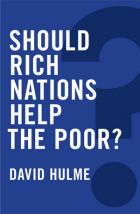Should Rich Nations Help the Poor?

“Almost 3 billion people are deprived of at least one basic human need: lack of access to food, drinking water, shelter, basic health services” and “some 19,000 children will die today of easily preventable causes” (page 2). Faced with such statistics in an affluent world, David Hulme tackles a critical question in Should Rich Nations Help the Poor? Across five chapters he argues that we should help the distant poor to achieve prosperity and human development not only out of moral duty, but also out of the pursuit of self-interest for our children and grandchildren (page 5).
Hulme acknowledges his academic colleagues and students at the University of Manchester’s Global Development Institute (GDI) for providing the intellectual base and academic stimulation for this essay. Written in an accessible manner, Should Rich Nations Help the Poor? discusses the limits of foreign aid, alternative policy solutions, the significance of climate change and inequality, and how to forge a genuine global partnership. Hulme addresses this complex topic with clarity and provides a platform for further discussion about future development initiatives. The book is therefore a good resource for development practitioners, planners and policymakers and laypersons questioning the future role of rich nations to help relieve inequality and poverty amongst the distant poor.
Chapter 1, “Why Worry about the Distant Poor?”, lays the foundation for this short book. Hulme identifies who the poor are, how rich nations have helped the poor for the wrong reasons, and the potential of a global partnership for development (Goal 8 of the Millennium Development Goals). He also identifies another important question: “What are the best ways for rich nations to help the poor?”
“The Limits of Foreign Aid” is the topic of Chapter 2. Here Hulme discusses how we can improve both foreign aid and the activities of international development agencies (page 31). To do this he first explores the quantity versus quality of foreign aid, the fundamental question “Does aid work?” (page 39), and how aid has been transformed recently by “mega-wealthy trusts such as the Bill and Melinda Gates Foundation” (page 45). Critically, despite its shortcomings Hulme still upholds aid as part of the solution meanwhile advocating for complementary policy changes to affect the “big picture” (page 53).
Chapter 3, “What Can Be Done?”, looks in detail at what policy changes rich nations can pursue to incorporate poorer nations into contemporary capitalism and promote equitable and sustainable economic growth. Concomitantly, Hulme acknowledges that these are harder to advance “as they confront the vested interests of economically and politically powerful groups in rich nations” (page 54).
In Chapter 4, Hulme examines how climate change and inequality are starting to limit success and the threat they pose for development. He notes how the negative consequences of climate change have become a global priority and states two key ways climate change reshapes how we tackle poverty (page 92). Furthermore, Hulme discusses the converging arguments about the negative impacts of rising inequality.
To conclude, Chapter 5, “From Broken Promises to Global Partnership”, proposes five main policy domains that need re-engineering for inclusive development for all humankind. It fundamentally suggests how change can happen and also highlights once again the key reasons – both ethical and out of self-interest – “why the citizens and leaders of rich nations should take action to help poorer nations” (page 122).
Book note prepared by Hannah Keren Lee
Search the Book notes database
Our Book notes database contains details and summaries of all the publications included in Book notes since 1993 - with details on how to obtain/download.
Use the search form above, or visit the Book notes landing page for more options and latest content.
For a searchable database for papers in Environment and Urbanization, go to http://eau.sagepub.com/

